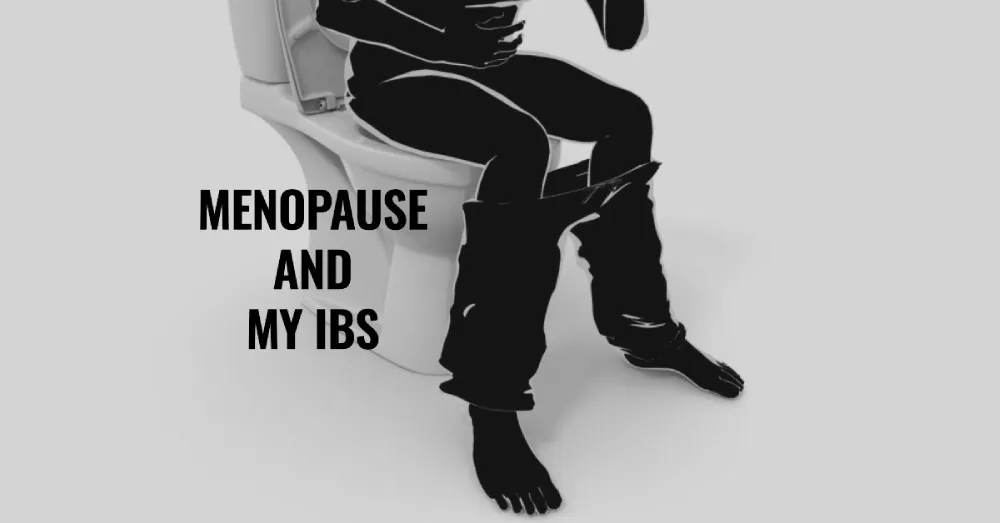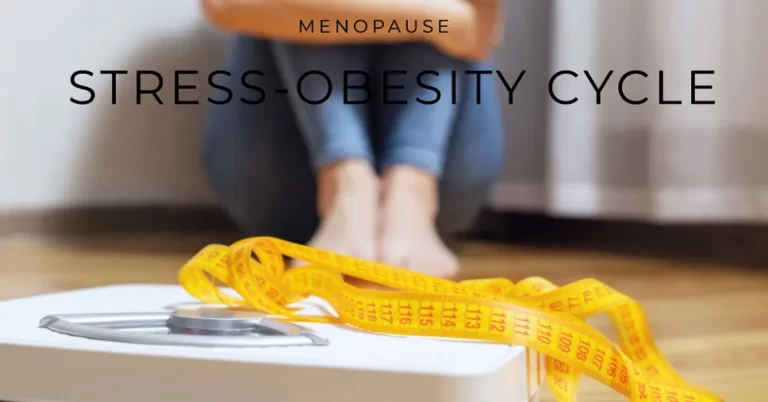Can Menopause Cause Irritable Bowel Syndrome: Menopause’s Effects on Gut Health and Digestion
Menopause is an inevitable phase in every woman’s life, with many physical and emotional challenges. Even though hot flashes, mood swings, and insomnia are the most common symptoms, menopause also affects gut health and digestion greatly.
When women hit menopause, hormone levels drop, and digestion gets weird. Adding insult to injury, hormonal fluctuations during this transition can worsen pre-existing conditions like IBS.
IBS is a chronic, long-term condition of the large intestine that causes abdominal pain, bloating, gas, constipation, and diarrhea. Menopause can worsen IBS by increasing inflammation and altering bacteria balance in the gut. Hormone levels also affect serotonin levels, a chemical responsible for controlling gut movement. When menopause decreases serotonin production, IBS symptoms can become more severe.
Although IBS can’t be cured, you can reduce symptoms by eating a balanced and healthy diet full of fiber-rich foods, probiotics, and prebiotics, avoiding trigger foods, and exercising regularly. Your doctor may also prescribe fiber supplements or antispasmodics to relieve discomfort.
Let’s explore the relationship between menopause and IBS and uncover if symptoms are caused or impacted by it. Also, we’ll talk about all possible causes of IBS and how to minimize discomfort.
Staying on top of these changes is key to maintaining your gut and overall health. Let’s optimize your gut function and well-being together.
The Gut and Female Reproductive Hormones
Guts are intricate organs of muscles, glands, and nerves that work together for digestion and absorption. The gut-brain axis communicates between the gut and brain through hormones, immune cells, and the vagus nerve.
Hormones like serotonin, estrogen, and progesterone are essential to maintain a healthy balance in this connection.
Estrogen and progesterone play crucial roles in maintaining gut health. Estrogen helps regulate gut inflammation, motility, and microbiota balance and protects against chronic gut diseases.
It also maintains the physical structure of the gut lining and promotes mucus production to eliminate harmful bacteria. On the other hand, progesterone regulates digestion and decreases inflammation to protect against damage from chronic diseases.
It also ensures smooth gut motility and proper breakdown of food. Menopause-induced decreases in estrogen and progesterone levels can negatively impact gut health and digestion.
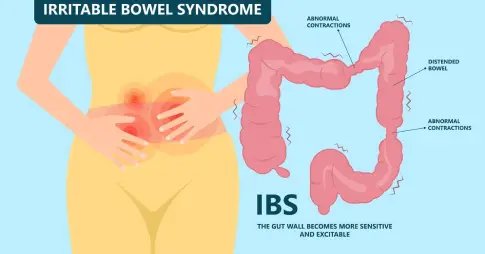
Links between sex hormones and gastrointestinal disturbances are proposed to be related to intestinal dysmotility, visceral hypersensitivity, intestinal barrier dysfunction, and mucosal immune activation. Menopause-induced hormonal changes can negatively affect gut health, increasing the likelihood of developing gastrointestinal disease.
Women with a history of gastrointestinal disease or experiencing previous gastrointestinal symptoms may be more prone to developing IBS during menopause.
Let’s look at the effects of hormones on gut health.
Gut Protection
Estrogen and progesterone help protect the gut by regulating motility, blood flow, and inflammation. They maintain the integrity of the gut lining by increasing mucus production and improving the absorption of nutrients.
Estrogen and progesterone are important in maintaining gut integrity and protecting against harmful pathogens. Estrogen, in particular, helps to maintain the physical structure of the gut lining and promotes mucus production, which helps to trap and eliminate harmful bacteria.
Additionally, progesterone helps to regulate gut motility, ensuring that food moves smoothly through the digestive tract and is properly broken down.
Digestive Enzyme Production
Estrogen and progesterone help to regulate the production of digestive enzymes, which are essential for breaking down food. They also help regulate bile acid production, which is necessary for fat digestion.
Gut Microbiome and Bacterial Balance
The gut microbiome, or the gut flora, is crucial to our health. It consists of trillions of microorganisms, including bacteria, fungi, and viruses.
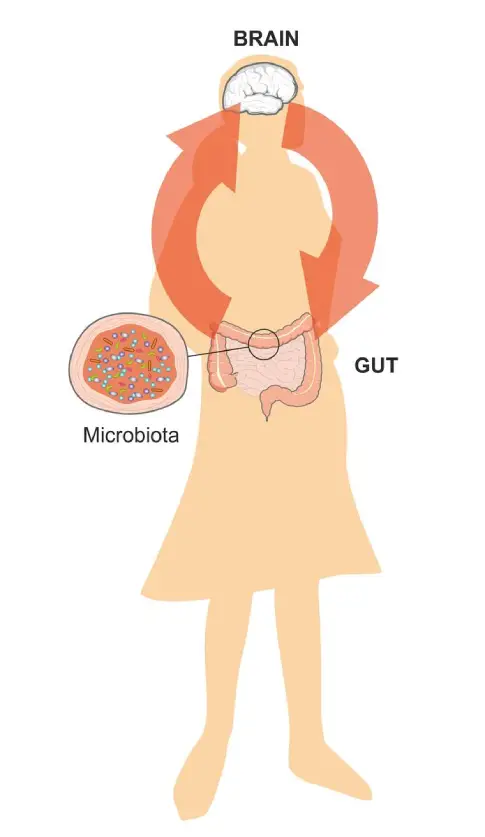
These microorganisms help to break down food, produce essential nutrients, and protect against harmful pathogens. Estrogen and progesterone help to regulate the gut microbiome, keeping it balanced and preventing the overgrowth of harmful bacteria.
Gut Movement
Estrogen and progesterone play a vital role in regulating the movement of our gut. Serotonin levels, which directly impact the functionality of our digestive system, are regulated by these hormones. These neurotransmitters work together to ensure a healthy gut movement, ultimately affecting our overall health.
Serotonin, commonly known as the “happy hormone,” is a crucial messenger in the brain-gut axis. It communicates with the neurons in the gut, sending signals that modulate gut motility, secretions, and sensations.
Estrogen and progesterone, the primary female sex hormones, directly influence the serotonin levels in our gut.
Today’s Discussion about Menopause’s Hormone Imbalance and IBS
As if dealing with menopause wasn’t enough, some women experience the added struggle of Irritable Bowel Syndrome (IBS). IBS is a gastrointestinal disorder that causes discomfort and pain in the abdominal area, along with other symptoms that can impact one’s quality of life.
Menopause itself can be difficult for many women due to hormonal changes and fluctuations, but when IBS is added into the mix, it can make things even harder to manage. Some common symptoms of IBS in menopausal women include chronic abdominal pain, bloating, diarrhea, constipation, and gas.
These symptoms can be severe and persistent, lasting for weeks or months. Additionally, many women find that their gut symptoms during menopause are similar to those experienced during monthly menses.
The root causes of IBS are not fully understood, but it is thought that emotional distress, food sensitivities, bacterial imbalances, and genetics may all play a role. Hormonal fluctuations during menopause could also be a contributing factor.
Researchers believe that dysbiosis (an imbalance of gut bacteria) and “leaky gut” (intestinal permeability) may also contribute to the development of IBS.
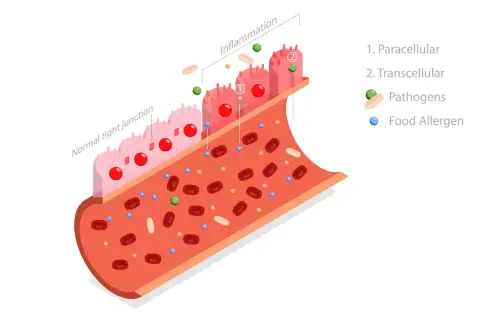
Menopause itself doesn’t cause IBS, but the hormonal changes associated with it may exacerbate pre-existing IBS conditions by increasing inflammation and altering the bacteria balance in the gut. Let’s see in more detail how menopause affects IBS.
Gut Motility
A gradual reduction in the production of hormones like estrogen and progesterone causes the menopause transition. These hormones play vital roles in maintaining the gut’s health by regulating serotonin levels, a neurotransmitter in controlling gut movement.
With the onset of menopause, the drastic reduction in estrogen production can disturb serotonin levels, causing gastrointestinal problems like irritable bowel syndrome (IBS). IBS is a common disorder that affects the large intestine and causes symptoms like bloating, abdominal pain, constipation, and diarrhea.
The decrease in estrogen levels can also reduce the thickness of the intestinal lining, leading to inflammation, bacterial overgrowth, and leaky gut syndrome. Additionally, the reduced levels of progesterone can cause relaxation of the smooth muscles of the gut, leading to constipation.
Gut Dysbiosis
The imbalance between beneficial and harmful bacteria in the gut may contribute to gut dysbiosis, a condition that occurs when the gut has an abnormal balance of microorganisms. This condition is caused by changes in reproductive hormones, chiefly estrogen.
Estrogen helps to maintain a balance of bacteria in the gut, and when levels of this hormone decrease, it can disrupt the balance, leading to inflammation, irritation, and an increase in potentially harmful bacteria.
Research has shown a correlation between reproductive hormones and microbiome diversity and composition measures. For example, a study in premenopausal women found that changes in estrogen levels were associated with changes in the gut microbiome.
Similarly, a study in rats found that ovariectomy (removal of the ovaries) led to changes in the gut microbiome. These findings suggest that changes in reproductive hormones during menopause can affect the gut microbiome and contribute to developing IBS.
However, these effects vary from person to person, and not all women experience problems with their gut health during menopause.
Inflammation due to Reduced Pathogen Protection
Maintaining the balance of hormones in your gut is essential to ward off harmful pathogens and ensure optimal digestive health. Declining estrogen levels can decrease mucus production, reducing protection against pathogens and fostering the development of IBS.
Mucus helps to form a physical barrier between the gut lining and harmful bacteria, viruses, and toxins. When this protection is reduced, inflammation may occur, resulting in IBS symptoms.
Progesterone also helps regulate inflammation, essential for protecting against damage from chronic diseases. When levels of these hormones decline during menopause, it can lead to an increased risk of infection and inflammation.
This can contribute to IBS symptoms like abdominal pain and bloating, as well as more serious gastrointestinal problems.
Changes in Digestive Enzymes
Declining levels of estrogen and progesterone can also affect the production of digestive enzymes. These enzymes are essential for breaking down food and extracting nutrients, but when levels of these hormones decline, it can lead to a decrease in enzyme production.
This can cause incomplete digestion, contributing to IBS symptoms like abdominal pain, bloating, constipation, and diarrhea.
Again, it is important to note that menopause does not cause IBS. But women with pre-existing gastrointestinal disease or who experience previous gastrointestinal symptoms may be more prone to developing IBS during menopause.
Menopause Stress and IBS
Menopause is a significant life transition that brings about hormonal changes, which can profoundly impact a woman’s body and mind. Menopause-related stress can trigger or exacerbate the symptoms of Irritable Bowel Syndrome (IBS), making it all the more important to understand the connection between menopause and IBS.
Research has shown that menopause-related stress can disrupt the delicate balance of the brain-gut axis, leading to alterations in gastrointestinal motility, secretion, and visceral sensation. This disruption can trigger or worsen IBS symptoms, causing abdominal pain, bloating, diarrhea, or constipation.
The autonomic nervous system regulates gastrointestinal function and is pivotal in developing IBS symptoms in menopausal women. Anxiety-related hyperalgesia is a common problem in women with IBS during menopause, which causes hypersensitivity to pain and discomfort in the gut.
Psychosocial stress has also been found to be a key factor in non-intestinal pain symptoms in IBS, especially in menopausal women. For women who have experienced stressful or traumatic events, the emotional distress associated with menopause can worsen IBS symptoms, leading to pain and discomfort that can lower the quality of life.
Menopausal women often face numerous challenges, such as hormonal fluctuations, sleep disturbances, lifestyle changes and family responsibilities, sudden changes in career or retirement, and the death of a spouse, etc. All these emotions can trigger changes in the gut-brain axis, leading to increased pain and discomfort.
It is crucial to understand the dynamics of stress and gut health during menopause to manage IBS effectively.
Scientific evidence suggests that higher levels of stress hormones, such as cortisol, can increase the likelihood of developing IBS, exacerbate the symptoms, and prolong the duration of flare-ups.
Cortisol is the “stress hormone” our bodies produce in response to various stressors. Although cortisol performs several essential functions, excessive amounts can lead to some unwelcome gastrointestinal symptoms.
Here are some significant ways cortisol can affect your gut health:
Increased Gut Motility:
Cortisol can cause the muscles in your digestive tract to contract more frequently, leading to increased gut motility. This increased activity can result in diarrhea, as food moves through the digestive tract too quickly, not allowing the body to absorb enough water from the waste.
Stress can also trigger the release of neuropeptides, which can stimulate the gut and cause pain, bloating, and diarrhea.
Reduced Acid Secretion:
Cortisol can also reduce acid secretion in the stomach, causing heartburn or reflux. When you have less stomach acid, food sits in the stomach for a more extended period, leading to bloating and discomfort.
Altered Microbial Balance:
A spike in stress hormones can lead to changes in the gut microbiome, such as an increase in pro-inflammatory bacteria or a decrease in beneficial bacteria. This, in turn, can lead to inflammation and further worsen IBS symptoms.
Ghrelin’s Respons:
The hormonal changes during menopause can also affect the stress response system, making women more vulnerable to stressors. When the body is under stress, ghrelin levels increase, leading to an increase in appetite.
This can be problematic for people with IBS, who may already struggle with eating due to gastrointestinal issues.
Also, ghrelin receptors in the digestive tract affect gut motility (food movement through the digestive system). This can contribute to IBS symptoms such as constipation or diarrhea.
Other Factors Contributing to IBS in Menopausal Women
Apart from the hormonal changes during menopause, several other factors can contribute to IBS in this population.
Gut Permeability and Inflammation during Menopause
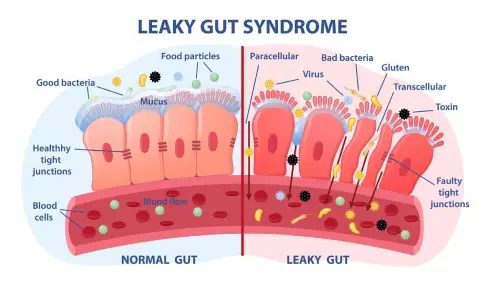
Menopause can increase gut permeability, allowing more substances to pass through the intestinal lining into the bloodstream.
This increased permeability can lead to inflammation, which exacerbates IBS symptoms.
Inflammation also leads to gut motility and sensitivity changes, contributing to IBS symptoms.
Surgical History and IBS Symptoms
Abdominal and pelvic surgeries have the potential to impact IBS symptoms, either by exacerbating existing symptoms or contributing to the development of new ones.
Cholecystectomy, or gallbladder removal, increases the risk of developing IBS.
Gynecological surgeries can lead to adhesions, scar tissue, and nerve damage, all of which can contribute to abdominal pain and other IBS symptoms.
Poor Lifestyle Habits
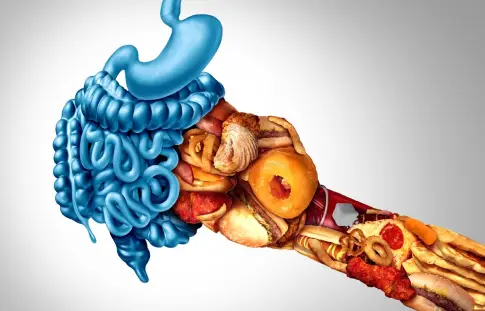
Lifestyle habits such as a lack of physical activity, poor diet, smoking, and alcohol consumption can also play a role in developing or exacerbating IBS symptoms.
Menopausal women should be evaluated for these lifestyle risk factors and provided with appropriate interventions to improve their overall health.
- Irregular eating habits: Irregular eating habits like skipping meals or eating too quickly can trigger IBS symptoms in menopausal women.
- Food sensitivities or intolerances: Menopausal women may be more prone to food sensitivities or intolerances due to hormonal shifts and changes in the gut microbiome. Common food triggers include dairy, gluten, eggs, soy, and artificial additives or preservatives.
- Poor Sleep: Sleep disturbances are common in menopausal women, as hormonal changes can disrupt sleep patterns. Poor sleep can contribute to gastrointestinal symptoms in IBS through altered gut motility and sensitivity.
Sleep disturbances are more common in midlife women undergoing perimenopause, post-menopause, or surgical menopause. Age-related changes in sleep architecture, sex hormones, vasomotor symptoms, medical comorbidities, psychosocial factors, and behavioral factors can all cause sleep disturbances in midlife women.
Psychological factors
Research suggests that stressful childhood events or trauma, emotional distress, depression, and anxiety are possible contributing factors to IBS. Women experiencing menopause may also be coping with additional stressors related to work, family, and social roles during this transitional period.
Abuse/Trauma History
Women with a history of abuse or trauma may be more susceptible to developing IBS. Assessments of prior abuse/trauma history, coping behaviors, and psychosocial factors may be critical for treating IBS and other chronic gastrointestinal disturbances in menopausal women.
Low Resilience
Low resilience is related to increased IBS symptoms and is not unique to IBS but likely related to the chronic, episodic nature of the disorder. Low resilience is associated with chronic stress, poor coping skills, and negative rumination or self-talk.
Medications Side effects
Certain medications, such as antidepressants, opioids, NSAIDs (nonsteroidal anti-inflammatory drugs), and some antibiotics, can cause gastrointestinal upset and worsen symptoms.
It is important to discuss any medications you are taking with your doctor to ensure they are not contributing to your IBS symptoms.
Managing Menopause and IBS Symptoms
The goal of IBS treatment is to reduce the severity of symptoms. We can prevent gut issues by incorporating hormone-friendly habits into our daily routines.
Comprehensive Approach to Treatment
There are three common types of IBS: IBS-C, IBS-D, and IBS-M. IBS-C is characterized by constipation, IBS-D by diarrhea, and IBS-M by alternating both episodes. It can be challenging to diagnose IBS since its symptoms can vary from person to person. However, some common symptoms include bloating, abdominal pain, gas, and bowel movement irregularities.
If you believe you may be experiencing IBS symptoms, seeing a doctor for a proper diagnosis is important. Your healthcare provider may recommend lifestyle changes, such as managing stress through exercise and relaxation techniques, eating a high-fiber diet, and avoiding trigger foods like caffeine and dairy products. Medications such as laxatives and antispasmodics may also be prescribed to alleviate symptoms.
A holistic approach can address multiple factors contributing to symptoms, improving overall health and well-being. This approach includes assessing psychosocial factors such as stress, depression, anxiety, and social support influencing symptom severity.
Trauma history, particularly abuse, should also be evaluated as it can contribute to IBS and menopausal symptoms. Treatment plans could include psychotherapy, relaxation techniques, and mindfulness practices to promote mental resilience and well-being.
Hormone Therapy for Symptom Management
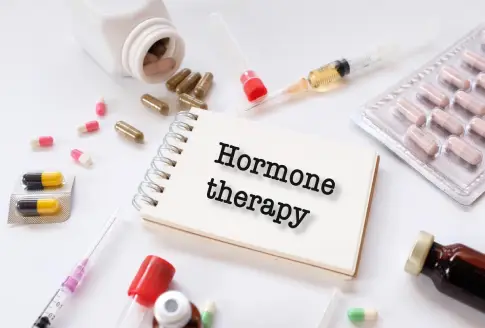
Hormone therapy has significantly alleviated menopausal and irritable bowel syndrome (IBS) symptoms in midlife women. Hormone therapy works by supplementing levels of estrogen and progesterone, which decline during menopause, leading to a range of symptoms such as hot flashes, night sweats, vaginal dryness, mood changes, and sleep disturbances.
Similarly, IBS symptoms such as abdominal pain, bloating, constipation, or diarrhea can also be partially alleviated with hormone therapy. However, it is important to mention that exogenous hormone use requires careful consideration in women with gastrointestinal symptoms, as it affects intestinal permeability and gut microbiota.
Exogenous hormone therapy has been associated with an increased risk of developing IBS in women who have never had it.
Hypnotherapy
Hypnotherapy has increasingly become a popular alternative therapy that has shown promising results in reducing the experience of nausea and managing Menopause IBS symptoms. It is a safe and non-invasive therapy that uses personalized techniques to help patients achieve deep relaxation, thus relieving symptoms associated with various conditions.
Several studies have confirmed the effectiveness of hypnotherapy in reducing nausea in cancer patients undergoing chemotherapy. Hypnotherapy has been shown to reduce nausea intensity and increase the number of nausea-free episodes. Hypnotherapy achieves this by reducing anxiety levels known to trigger nausea.
Menopause IBS symptoms can be challenging to manage, but hypnotherapy has proven to be highly effective in managing these symptoms. This gastrointestinal disorder is caused by an accumulation of tension, leading to gut inflammation. Hypnotherapy helps to relieve this stress and improve gut digestion, thus reducing IBS symptoms.
Hypnotherapy consultations with professional therapists include a relaxation process that helps clients reach a deep state of mind where they’re more receptive to positive suggestions. Friendly and lively hypnotherapy therapists work with clients to identify the root cause of their symptoms and develop personalized treatment plans to manage them effectively.
CBT and Mindfulness-Based Stress Reduction
Mindfulness-based stress reduction (MBSR) and cognitive behavioral therapy (CBT) are evidence-based psychological therapies that effectively reduce stress, anxiety, and depression.
These interventions can also improve IBS symptom severity by working on thoughts, feelings, behaviors, and physical sensations related to IBS.
Relaxation Techniques for Stress Management
Meditation, deep breathing, yoga, and tai chi are some relaxation techniques that can effectively manage stress levels. These practices help calm the body’s nervous system and relax the abdominal muscles that can get tense due to stress or anxiety.
Practicing these activities daily can reduce menopause IBS symptoms, such as cramping and bloating. It can also reduce the frequency of flare-ups significantly, making it easier to manage them in the long run.
Effective Natural Strategies IBS Management
While hormonal changes during perimenopause and menopause can make digestive problems more likely, there are steps women can take to manage these symptoms. Here are some tips:
Probiotics and Prenatal Vitamins
Incorporating probiotics into the diet can help promote healthy gut bacteria and reduce inflammation.
Probiotics are live microorganisms that enhance the activity of the gut. They help to balance gut flora, reduce inflammation, boost immunity, and improve digestion.
Regularly consuming fermented foods like yogurt, kefir, sauerkraut, kimchi, and kombucha can improve gut health and reduce menopausal digestive symptoms. Also, probiotic supplements are available in capsule, powder, and liquid form that can be taken regularly for better results.
Prenatal vitamins are also known to help alleviate menopausal digestive symptoms due to their high content of calcium, magnesium, B vitamins, and other essential nutrients.
Trigger Foods and Eating Behaviors in IBS
Identifying specific trigger foods and eating behaviors is essential in managing IBS. Foods high in fat, caffeine, dairy, and artificial sweeteners are common culprits of IBS symptoms.
Certain foods and beverages can trigger IBS symptoms. Eating large meals and consuming alcohol and spicy foods can also exacerbate symptoms. So, start keeping a food diary to keep track of what you eat and how it affects you can help you identify and avoid triggers.
Maintaining regular eating habits is also crucial in managing IBS symptoms. Skipping meals, irregular eating patterns, and fasting can lead to digestive discomfort. Therefore, it’s recommended to eat small, frequent meals throughout the day and avoid overeating.
Caution in Dietary Approaches
Although dietary modifications can help manage IBS, caution is necessary when implementing them. It’s crucial to consult a healthcare provider or registered dietitian before starting any severe dietary restrictions, as eliminating entire food groups can lead to nutrient deficiencies.
Moreover, screening for eating disorders is also crucial, as restrictive diets can trigger or worsen symptoms of disordered eating. Psychosocial factors should also be considered when making dietary decisions, as stress, anxiety, and depression can contribute to IBS symptoms.
Therefore, it is essential to address the underlying psychosocial issues and develop a holistic plan for symptom management.
Opt for Fiber Rich Gut Friendly Diet
Fiber plays a significant role in digestion and aids in preventing constipation, which is a common menopausal digestive symptom. Women over 50 require at least 21 grams of fiber daily, but most consume less than half of that.

Consuming fiber-rich foods like fruits, veggies, whole grains, legumes, nuts, and seeds can effectively manage digestive symptoms. Additionally, increasing water intake can help fiber do its job effectively.
A diet low in FODMAPs (fermentable oligosaccharides, disaccharides, monosaccharides, and polyols) successfully reduces gastrointestinal issues associated with menopause. Foods high in FODMAPs, such as beans, lentils, dairy products, onions, garlic, wheat, and sugar alcohol, cause bloating, gas, and diarrhea.
Monitoring food intake can also be beneficial for managing IBS symptoms. A food diary can help identify which foods exacerbate or relieve the symptoms. Eating smaller meals more frequently is another dietary strategy experts recommend to reduce menopausal digestive symptoms.
Stay Hydrated
Dehydration can cause digestive issues, so staying hydrated is incredibly important. Women are recommended to drink at least eight 8-ounce glasses of water daily or roughly 2 liters of water per day.
Drinking water can effectively manage digestive symptoms and reduce inflammation in the gut. Green tea and coconut water are other non-alcoholic beverages that can improve digestion and overall gut health.

Chewing ginger, wearing sea bands, sipping peppermint tea, and eating bland foods may also soothe nausea.
Eat more Healthy Fat
Fat is necessary to absorb vitamins, but consuming unhealthy fats like trans fats and saturated fats can cause digestive issues. Healthy fats like omega-3 fatty acids, found in fatty fish, nuts, and seeds, can be beneficial for menopausal digestive symptoms.
ALA, EPA, and DHA are the essential omega-3 fatty acids that maintain gut health and effectively manage digestive symptoms.
Eat Less Sugar and Processed Food
Sugar is not harmful in moderation, but excessive sugar intake can cause inflammation, gut dysbiosis, and other digestive issues. Avoiding processed foods and sugary drinks can effectively manage menopausal digestive symptoms, enhancing overall health.
Instead, choose natural sweeteners like honey, maple syrup, stevia, or fruits to sweeten food.
Power of Exercise: The Surprising Benefits for Your Gut Health
Exercise helps with weight management and has beneficial effects on digestive health. Physical activities like walking, running, and yoga can help reduce stress levels, manage food cravings, and alleviate symptoms of IBS.
Exercising regularly helps stimulate bowel movements and increase metabolism rates, both of which have a significant impact on managing IBS symptoms. Exercise benefits menopausal women experiencing constipation or bloating and helps regulate bowel movements and soothe digestive processes. Exercise can also help regulate changes in appetite, reduce gas build-up, and prevent constipation, all common IBS symptoms plaguing menopausal women.
- Sneak in Activities Whenever Possible:
Regular exercise doesn’t necessarily imply visiting the gym or investing significant time and effort. Sneaking in some physical activity throughout the day can be just as effective.
Engage in activities that raise your heart rates, such as playing with children or grandchildren, gardening, cleaning, or any other tasks that require movement. These simple tasks help burn calories and reduce the risk of developing chronic illnesses, boost energy levels, and enhance mental health.
- Focus on Low-Impact Exercises:
Low-impact exercises are easier on the joints and muscles, making them ideal for older people or those who experience menopause IBS symptoms. Walking, swimming, and cycling are perfect examples of low-impact activities that can be performed regularly to strengthen the body and manage IBS symptoms.
These exercises boost mobility and assist in regulating digestive health in those over 50, who tend to lead more sedentary lifestyles. It can help relax the abdomen muscles, reducing bloating and cramping.
- Exercise Helps Reduce Depression and Anxiety:
Exercise has profound effects on mental health, particularly reducing depression and anxiety. Regular exercise stimulates the release of endorphins, the “feel-good” hormones responsible for feelings of happiness, contentment, and relief from pain.
Furthermore, exercise helps reduce the stress hormone cortisol, which reduces anxiety and depression symptoms. Regular exercise can improve your physical and mental health and reduce menopause IBS symptoms significantly.
Adequate Sleep Routine
Getting enough sleep is paramount for both physical and mental health. Poor sleep can disrupt the natural balance of hormones, leading to digestive issues.
Ensuring you get 7-8 hours of uninterrupted sleep daily can reduce stress levels and help regulate IBS symptoms in menopausal women. Avoiding late-night eating, caffeine, alcohol, and electronic devices before bed can help ensure a good night’s sleep.
Additionally, adding herbs such as chamomile or lavender to your tea before bed can help relax the body and improve sleep quality.
Are probiotics good for Menopause IBS?
If you are a menopausal woman suffering from IBS, incorporating probiotics into your everyday routine might be a great idea. Probiotics have been proven safe and effective in treating IBS symptoms such as bloating, abdominal pain, constipation, diarrhea, nausea, vomiting, and stomach rumbling.

And taking probiotics for a shorter duration of fewer than eight weeks with a higher dosage of a single strain has shown to be more beneficial. When choosing a probiotic strain, consider Bacillus coagulans strain LBSC (DSM17654), which is efficacious in alleviating IBS symptoms and improving the overall quality of life.
Moreover, research has shown that probiotics may improve gut transit time, stool consistency, and overall stool frequency. It is essential to note that probiotics are safer than many other treatment options available today, and adverse events associated with probiotics are minimal.
Incorporating probiotics into your everyday routine may positively impact your IBS symptoms and improve your overall quality of life. However, it is recommended to consult with your healthcare provider before initiating any probiotic or dietary changes.
Are probiotics quick to work?
Probiotics effectively reduce symptoms of irritable bowel syndrome (IBS) for many individuals; however, the timing of when they start to work can vary depending on the individual and the specific strain of probiotics used.
For menopausal women experiencing IBS symptoms, the beneficial effects of probiotics may take some time to become apparent. In a study published in the Journal of Clinical Gastroenterology, women with IBS took a probiotic supplement for four weeks and reported no significant improvement in their symptoms.
However, after another four weeks of continued use, these women reported reduced bloating, abdominal pain, and other IBS symptoms. It is important to note that not all probiotics are created equal, and some may work more quickly than others, depending on their composition.
For example, in a randomized controlled trial published in the Journal of Nutrition, participants taking a combination of Lactobacillus acidophilus and Bifidobacterium animalis experienced a significant reduction in IBS symptoms after just two weeks of daily use. On the other hand, a study published in the International Journal of Food Microbiology found that a probiotic containing Lactobacillus paracasei required eight weeks of use before significant improvements in IBS symptoms were observed.
Overall, it is recommended that individuals experiencing IBS symptoms give probiotics at least 4-8 weeks to start working before deciding whether or not to continue use. It is also important to work with a healthcare provider to determine the most appropriate probiotic strain and dosage for your individual needs.
When is the best time to take a probiotic for Menopause IBS?
Based on research, the ideal time to take probiotics for Menopause IBS is first thing in the morning on an empty stomach. This ensures that the beneficial bacteria can reach your gut quickly and start working to rebalance your gut microbiome.
It’s worth noting that different strains of probiotics may have different optimal dosing times, so it’s best to consult with a healthcare professional or the product label for specific instructions.
In addition to timing, choosing a high-quality probiotic supplement that contains strains proven to have beneficial effects on IBS symptoms is also essential. Look for products that contain Lactobacillus acidophilus, Bifidobacterium bifidum, or Saccharomyces boulardii, which have been shown to reduce bloating, gas, and constipation.
Make Menopause-Related IBS a No-No for a Happy, Healthy Transition
Managing menopause-related IBS can be challenging, but it’s not impossible. With the right lifestyle modifications, natural remedies, and support from healthcare professionals, women can overcome digestive discomforts and enjoy a high quality of life during and after their transition.
Every woman’s experience with menopause is unique, so there is no one-size-fits-all solution. However, there are a variety of effective strategies that can help alleviate common symptoms like bloating, constipation, and abdominal pain. From incorporating anti-inflammatory foods into your diet to practicing relaxation techniques like yoga and meditation, simple changes can help improve digestive health and overall well-being.
Working with a trusted healthcare provider can also be vital in maintaining digestive health during menopause. They can help explore different treatment options, test for food sensitivities, and offer compassionate support to help women feel empowered and in control of their health.
At the end of the day, it’s important not to let menopause-related IBS take away from the joy and vitality of life. Taking an active role in digestion management and seeking support can help women navigate the transition gracefully and easily.

